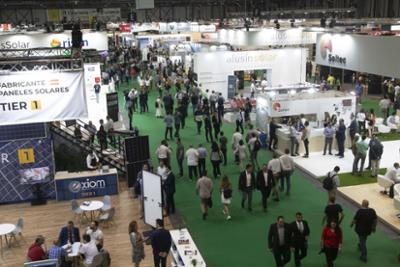

GENERA 2023 holds its most representative and international event

With the participation of 385 exhibitors and 18,000 m2 of exhibition space, the trade fair achieves its best figures ever, continuing its uninterrupted growth since 2018.
This year's event is highly internationalised, with the presence of 141 companies from 21 countries, representing almost 37% of the total participation in GENERA. The International Conference on Renewable Energies (SPIREC) will be held for the first time in Spain to coincide with GENERA. Organised by IFEMA MADRID, with the support of the IDAE, GENERA will be held from 21 to 23 February at the Recinto Ferial.
The International Energy and Environment Trade Fair, GENERA 2023, is holding a powerful and strategic event from 21 to 23 February, reflecting Spain's role as one of the world's leading players in the development of renewable energies, as well as the global boom in clean energies and their contribution to the transition towards a sustainable energy system aimed at achieving the 2050 climate targets, and presenting a great opportunity for the entire value chain of this industry.
According to the Renewable Energy Country Attractiveness Index report, which ranks the world's top 40 renewable energy markets according to the attractiveness of their investment opportunities to ensure that no one is left behind, Spain is in eighth place among the countries with the greatest investment attractiveness in renewable energies in this year's world ranking, climbing one position compared to the previous GENERA fair.
Organised by IFEMA MADRID, with the support of the Ministry for Ecological Transition and the Demographic Challenge, through the Institute for Energy Diversification and Saving, IDAE, this year GENERA 2023 shows significant growth in all its parameters, bringing together 385 direct exhibitors from 21 countries in 18,000 m2 of exhibition space.
With these excellent results, GENERA has achieved its best figures ever, continuing its uninterrupted growth since 2018. In figures, the total participation (national + international) in GENERA has grown by 45% compared to 2022, and even more significant is the increase in the exhibition area, which on this occasion will be spread over two halls (8 and 10), with a 70% increase in occupancy.
Significant internationalisation
Equally noteworthy is the growth in international participation, which has risen to 141 companies, representing almost 37% of the total participation in GENERA. In this respect, it is worth highlighting the growth trend that the fair has been experiencing, with the participation of companies from China, in addition to Germany, Italy, Turkey, the Netherlands and Portugal.
GENERA 2023 Technical Conferences
GENERA will round off its content with a four-day programme of Technical Conferences that will bring together experts from the sector to examine and discuss relevant issues such as the energy transition and new models based on energy communities, energy storage, green hydrogen, self-consumption and decarbonisation processes in the sector, among other topics - more than 20 sessions organised by the main sectoral associations, technology centres and public authorities.
The fair also features a series of informative sessions and product presentations as part of FORO GENERA, which will address new industrial and technological developments and financing schemes, among other initiatives. In addition, the FORO GENERA SOLAR, organised in conjunction with the Unión Española Fotovoltaica (UNEF), will focus on decarbonisation in rural areas and the promotion of renewable energies in the context of rising inflation, among other issues.
Innovation Gallery
Furthermore, as it does every year, the GENERA Innovation Gallery will showcase some of the lines of research in renewable energies and energy efficiency on which the sector is working, through a selection of projects with a marked focus on technological innovation, selected by a panel of experts.
SPIREC, an opportunity for the promotion of renewable energies at all levels
As a new event, in parallel with GENERA, the International Conference on Renewable Energies (SPIREC), organised by the Spanish Government, through the Institute for Energy Diversification and Saving (IDAE), and the international platform REN 21, will be held from 20 to 23 February. SPIREC23 will be the venue for political leaders, companies, NGOs and experts to discuss the best public policies, private initiatives and experiences in the promotion of renewable energies at all levels.
This international exchange among all stakeholders offers a unique approach to deepening and broadening the debate on how to achieve an energy system that supports sustainable development and climate goals: advancing from social acceptance to public participation, providing the necessary qualified human resources, the geopolitics of critical minerals, maximising industrialisation opportunities and the development of a robust green hydrogen chain, among others. The choice of Spain to host this international conference - which is held every two years, the last events taking place in Seoul, Mexico City and Cape Town - is no coincidence: Spain's leadership in clean energy is unquestionable. It is the world's eighth leading country in terms of total renewable energy capacity, the top country in solar photovoltaic and wind energy, and the eighth most attractive market for green energy.
Sector context
Spain is the world's eighth leading country in terms of renewable energy, the world leader in solar photovoltaic and wind energy and ranks second in Europe in total wind power capacity (28.2 GW), after Germany. According to APPA's "Study of the Macroeconomic Impact of Renewable Energies in Spain", in 2021 high energy prices and structural growth led to a record boost in the sector's activity, which grew by 50% and represents 1.58% of the national GDP.
Moreover, according to Mincotur's report "Fair Transition within the Strategic Energy and Climate Framework", governments around the world are speeding up their renewable energy programmes to reduce their dependence on imported energy. These measures include increasing renewable generation, accelerating energy diversification and increasing energy storage. It also notes that investment in grids will be key to securing energy supply and achieving zero emissions by 2050. These issues, together with the fair transition that involves modernising the economy towards a sustainable and competitive model that contributes to curbing climate change with a strategy that ensures that people and regions make the most of the opportunities of this transition, will be of crucial importance.




